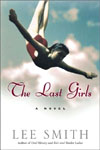
Comment
on this story
|
 |

A metaphor for life
by Jeanne McDonald
In 1965, when novelist Lee Smith was a student at Hollins College, she and 15 other girls who had been studying Huckleberry Finn in their American literature class decided to emulate the fictional hero by traveling down the Mississippi River on a 40- by 16-foot raft. The Rosebud Hobson, an $1,800 craft, was built of wooden planks attached to 52 oil drums and run by two 40-horsepower motors. Its superstructure was made of two-by-fours, with a tarpaulin and mosquito netting, either of which could easily be attached when the necessary circumstances demanded. The primitive shower consisted of an overhead bucket with a long rope attached, although bathroom facilities still remain a mystery.
That 950-mile trip from Paducah, Ky., to New Orleans was the sort of adventure that would appeal only to the young and stalwart, and, besides, says Smith now, "If anything really bad happened to us, we knew we could call up our parents collect, and they would come and fix things. We expected to be taken care of. Nobody had ever suggested to us that we might ever have to make a living, or that somebody wouldn't marry us and then look after us for the rest of our lives. We all smoked cigarettes. We were all cute. We headed down that river with absolute confidence that we would get where we were going."
And they did. "...[I]f you are cute and sing a lot of songs," she continues, "people will come out whenever you dock and bring you pound cake and ham and beer and keys to the city, and when you get to New Orleans you will be met by the band from Preservation Hall on a tugboat, and showered by red roses dropped from a helicopter, paid for by somebody's daddy."
Fanatically covered by the press in each town they docked, the rafters were referred to as girls. "Today, of course," says Smith, "they'd call us women. We were the last girls..." So when a tipsy book-club member about Smith's age came up to her after a recent reading and demanded, "Why don't you write about us?" Smith thought, "OK. Time to get back on that raft."
In her new novel, The Last Girls (Algonquin, $24.95), written 34 years after the trip, Smith takes us on a fictitious journey down the Mississippi River on a luxury steamboat, The Belle of Natchez, with four of the original "girls" and one of their husbands. 
Their purpose is to scatter the ashes of one of their raftmates—the beautiful but bipolar Baby Ballou—when they reach New Orleans. During the trip, all of the women experience epiphanies that send them home with new realizations about themselves and their friends. Anna, a successful and wealthy romance writer, grieves for the loss of her youthful attractions and her one true love, Lou, but finally realizes she can create many exciting lives through her passionate novels. Harriet, never married and still mourning the death of the boy that Baby stole from her and then threw away, begins to realize that Pete, the Mark Twain impersonator who travels on the boat, is a nice man and a realistic, if not perfect, substitution for the deceased Jeff. Then there is Catherine, who, during the trip, falls back in love with her alcoholic husband, Russell; and Courtney, who suddenly realizes that her husband's mysterious disease might well be terminal, and that she must stand by him through his illness and give up her more exciting illicit lover.
Thus, sliding easily back and forth from the past to the present, Smith ably tells the story of "us," women like herself, women with universal hopes and failures, women with sometimes dull husbands and errant children with whom they fall cyclically in and out of love, women who have hot flashes and vivid sexual fantasies, women who finally have to come to terms with the inevitable structure of their lives. As a writer, Smith has a unique gift for finding humor in even tragic circumstances, a sort of bittersweet view of life. For example, when Catherine discovers a lump in her breast during the journey down river, her thoughts race between the serious and the ridiculous. "...[O]h God, what if she has to have a mastectomy? Breasts are really important to Russell. What if she dies? Two of her friends have died from breast cancer already. The question is not why me? The question is why not me? Well, shit...Catherine puts creme rinse on her hair anyway; you might as well look good even if you're dying."
Smith avows that the raft trip down the Mississippi was "the only journey I ever made which ended as it was supposed to. . . . For life has turned out to be wild and various, full of the unexpected, and it's a 'monstrous big river' out here."

August 22, 2002 * Vol. 12, No. 34
© 2002 Metro Pulse
|